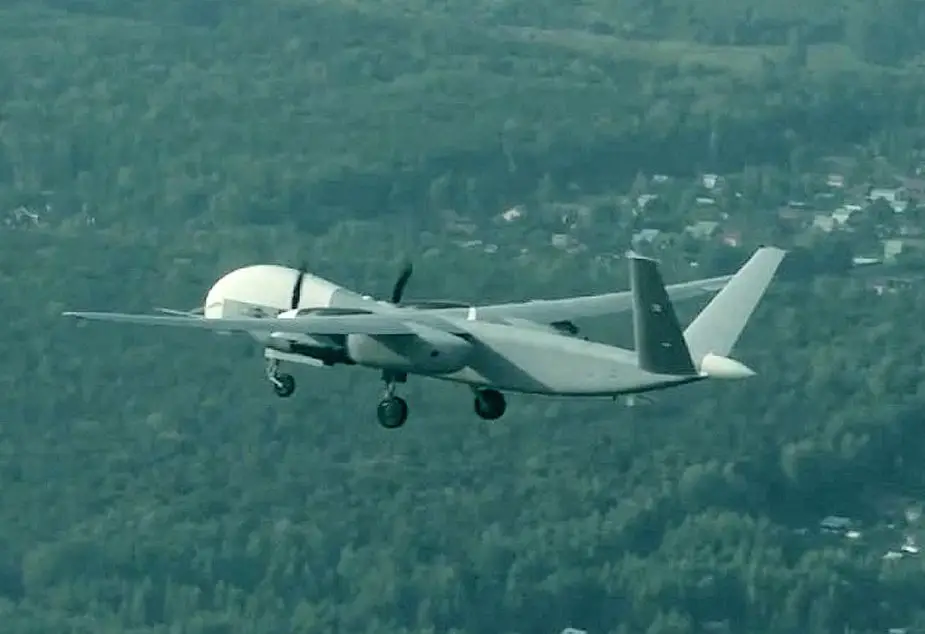Russian Altius attack drone to operate in autonomous regime
The Altius attack drone will have artificial intelligence elements to interact with fifth-generation Sukhoi Su-57 fighter jets. It will lay routes to bypass air defense without human interference, find and attack important targets (headquarters, communication hubs, missile launchers) and return to the base. Experts believe the new capabilities will develop Altius into a universal weapon, the Izvestia daily writes.

Altius-U (Picture source: Russian MoD)
Defense industry sources said the design of the upgraded Altius option had begun. It will have artificial intelligence and Su-57 fighter jets will be able to remotely control it. The equipment will be installed by the end of 2020 and tests will begin thereafter.
The upgraded Altius can operate strikes independently. It obtains coordinates and calculates the best flight route to the target and the release point. The drone takes into consideration the information about the air situation and adversary air defense supplied by the headquarters in real-time. It will decrease drone losses in conflicts with the adversary armed with powerful air defense. After the mission, the drone can automatically return to the patrol area by the safest route. At present, ground operators control all flight stages of all drones. The artificial intellect will decrease the load on operators in long flights. Altius can fly non-stop for over a day.
The drone will operate together with manned aircraft. In September 2019, the Defense Ministry demonstrated joint actions of Su-57 and a 20-ton Okhotnik combat drone. Altius will get the same capability. When a pilot detects a target, he will transmit coordinates to a drone by protected communication channels. The drone will then fulfill the combat mission itself without human interference.
Altius will be armed with a family of Grom gliding bombs. They exceed ordinary 500-kg high-explosive fragmentation bombs in firepower and can hit targets at a distance of 120 km. They will target headquarters, radars, missile and air defense, ground-based cruise missile launchers, etc.
Such drones will be engaged in a standoff with the leading armies rather than terrorists, expert Vadim Kozyulin said. "Russia lagged behind in the design and engagement of drones. Today we bypass the tactical level and create strategic drones. They do not cede to US, British and Chinese designs. Ordinary aviation carries munitions, reconnaissance means and electronic warfare in a single aircraft which is very expensive. It is costly to lose one. The modern idea calls to create several drones operating together with the aircraft and taking over a part of the load (Note from Army Recognition: but what if one or more of these drones are shot down or fail? Would the attack still be possible?). They will be closer to the adversary and see it better. They can bear the brunt of an attack, if necessary. A human will survive. Cheap hardware may be lost," he said.
Altius is one of the three Russian combat drones. It has faced problems since the beginning of the design and no batch production has begun, therefore.
In late 2018, the project was moved from Kazan to the Ural Civil Aviation Plant (UZGA). The enterprise is experienced in drone production. It produced several Forpost reconnaissance drones and dealt with the localized and upgraded Forpost-R option.
In 2019, the enterprise in Yekaterinburg presented an upgraded Altius-U option with satellite communications. Now the range is limited only by the fuel reserve. The satellite equipment will allow the drone to attack targets hundreds and thousands of kilometers away from its base.
In December 2019, the Defense Ministry and UZGA signed a contract for Altius-RU R&D. It has to take into account all the latest achievements and requirements of the military. It will be the basis for the production of heavy drones for the Russian armed forces. The drones are to be supplied to the Aerospace Forces and the Navy, the Izvestia said.
© Copyright 2020 TASS / Army Recognition Group SPRL. All rights reserved. This material may not be published, broadcast, rewritten or redistributed.





























